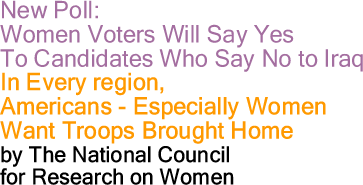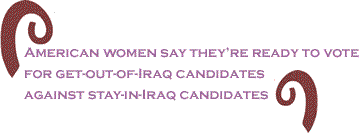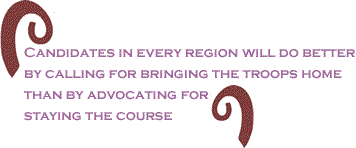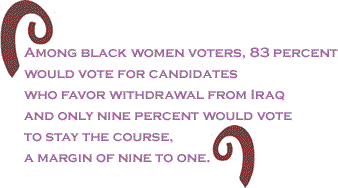
|
|||||||||||||||||||||
 |
|||||||||||||||||||||
 |
|||||||||||||||||||||
 |
|||||||||||||||||||||
 |
|
With the election rapidly approaching, candidates who favor getting American troops out of Iraq have a nearly three-to-one advantage among women voters over politicians who want to stay the course. That’s the message from a major new poll of registered voters released November 2, 2006. And, according to NCRW, the National Council for Research on Women, women voters are leading the electorate in demanding a pullout. “This is across the board, in every section of the country, in cities and rural areas, across racial divides, American women say they’re ready to vote for get-out-of-Iraq candidates against stay-in-Iraq candidates, with a three to one preference for candidates who want to get the troops out of Iraq over those who want to keep the troops there,” according to NCRW President Linda Basch. “This isn’t just in a few blue states,” Basch said. “Candidates in every region will do better by calling for bringing the troops home than by advocating for staying the course. In the South—among all voters, women and men, it’s a two-to-one margin for the peace candidates. Even in the West, the margin is 51 to 30. In the Northeast, the margin is three to one for bringing the troops home,” according to Basch. Survey respondents were asked if they would be “more likely to vote for a candidate for Congress who favors withdrawing troops from Iraq within the next 12 months, less likely to vote for this candidate, or would it not make a difference to you either way?” Black and Hispanic women are even more united in their opposition to the war. Among black women voters, 83 percent would vote for candidates who favor withdrawal from Iraq and only nine percent would vote to stay the course, a margin of nine to one. Among Hispanic women voters, the margin is 68 to 11, or six to one. The new poll confirms a trend reported on in a Ms. Magazine poll conducted five months ago. At that time, pollster Celinda Lake reported that 55 percent of women favored troop withdrawal. The poll released today shows 59 percent of women favoring candidates who want the troops out, compared to only 21 percent who would vote against them. Among men, 48 percent now say they would vote for candidates who want to bring the troops home and 31 percent say they would vote against them. In the Ms. Poll five months ago, 43 percent of men favored troop withdrawal while 51 percent wanted to stay the course or increase American troop presence in Iraq.
In the NCRW poll, Democratic women favored candidates who want to bring the troops home by over eight to one (78 percent to 9 percent). Independent women favored bring-the-troops-home candidates by five to one (60 percent to 12 percent). Republican women were slightly likelier to vote for stay-the-course candidates (42 percent to 35 percent). Iraq showed up on the NCRW poll as the most important voting issue, with more than one out of five naming it first or second on an open-ended question, leading the economy, health care and education, the only other issues cited by more than one out of ten people. “Women are shifting away from fear to hope as they view the issues. Education is clearly a more important issue than terrorism for moms in this poll,” Basch said. “They want politicians to focus on education and the economy rather than on orange alerts.”
Black women are especially likely to consider education a key issue, with fully 98 percent saying it is either extremely or very important. Low income women are likelier than high income women to cite education as highly important. A majority of both women and men want schools to include comprehensive sex education, including teaching about birth control and safe sex. By a margin of more than two to one, they would vote for a candidate who favored comprehensive sex education over a candidate who opposed it. The cost of post-secondary education is a concern to most American voters. The vast majority of both women and men want to increase student aid for college and university. By a margin of more than five to one overall – and six to one for women – they would vote for a candidate who favored increased student aid over a candidate who opposed it. The cost of post-secondary education is a concern to most American voters. The vast majority of both women and men want to increase student aid for college and university. By a margin of more than five to one overall – and six to one for women – they would vote for a candidate who favored increased student aid over a candidate who opposed it. Women are also at least five times more likely than less likely to vote for a candidate who supports full funding of the Violence Against Women Act, a higher minimum wage, a national guarantee of affordable, accessible and quality health care for all, and guaranteed paid sick days for all workers, according to the NCRW poll.
The NCRW poll was conducted on the telephone between September 28 and October 9 among a random sample of 2,097 registered voters by Opinion Research Corporation of Princeton NJ. The margin of error is two percentage points. The National Council for Research on Women is a network of more than 100 leading U.S. research, advocacy and policy centers with a growing global reach. The Council harnesses the resources of its network to build a more inclusive and equitable world for women and girls. President Linda Basch holds a doctorate in anthropology from New York University. She has served as Dean of Arts and Sciences at Manhattan College, Director of Academic Programs at NYU, as a research director at the United Nations, and is a Fellow of the New York Academy of Sciences. Dr. Basch is widely published and has conducted research in Africa, Iran, the Caribbean and the US. You can contact The National Council for Research on Women at ncrw.org |
|
| Home | |
Your comments are always welcome. Visit the Contact Us page to send e-Mail or Feedback or Click here to send e-Mail to [email protected] e-Mail re-print notice
If you send us an e-Mail message we may publish all or part of it, unless you tell us it is not for publication. You may also request that we withhold your name. Thank you very much for your readership. |
|
| November 2, 2006 Issue 204 |
||||||||||||||
|
||||||||||||||
|
||||||||||||||
| Printer Friendly Version in resizeable plain text format | ||||||||||||||
 |
||||||||||||||
 |
||||||||||||||
 |
||||||||||||||
 |
||||||||||||||
| |
||||||||||||||
| |
||||||||||||||































